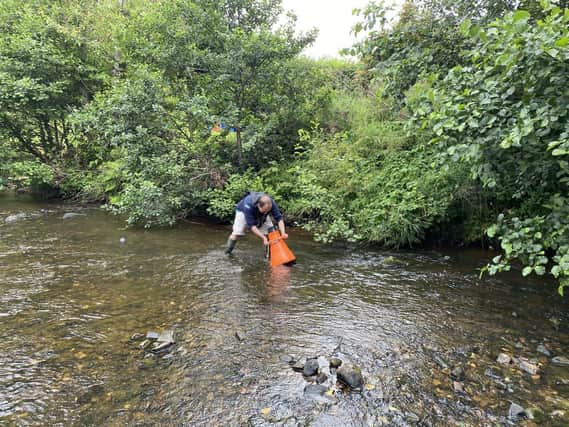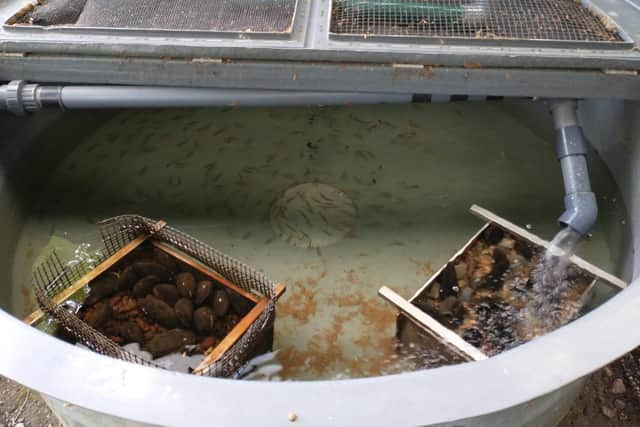Project to boost Yorkshire's numbers of the near extinct freshwater pearl mussel which sparked the Roman invasion of Britain


Now a partnership project between the Freshwater Biological Association (FBA), Yorkshire Water and the North York Moors National Park Authority, is hoping to restore numbers of the once prevalent freshwater pearl mussel through a captive breeding programme using mussels from the River Esk in North Yorkshire.
Important for biodiversity, the mussels, which live for more than 100 years, anchor themselves to the riverbed and filter water through their gills removing particles such as algae and sediment which improves the overall water quality for other species.
Advertisement
Hide AdAdvertisement
Hide Ad“Freshwater pearl mussels are incredible creatures, and their continued presence in British waters is really important,” said Ben Aston, principal ecologist at Yorkshire Water.


Once commonplace in Britain’s rivers, over the centuries poaching, loss of habitat, the decline in salmonid stocks and pollution have seen the mussel numbers decline drastically with an estimated 500,000 pearl mussels left in England, with a population loss of around 90 per cent since the beginning of the 20th century.
Considered endangered, most of the remaining pearl mussels in the UK reside in just a few river systems , with only one in Yorkshire.
Famed throughout history, Julius Caesar’s biographer cited his admiration of fresh water pearls as a motive for the first Roman invasion of Britain in 55BC. And the Kellie Pearl, believed to be the largest freshwater pearl ever discovered in Scotland, was incorporated into the country’s ancient crown first used at the coronation of Mary Queen of Scots.
Advertisement
Hide AdAdvertisement
Hide AdLouise Lavictoire from the FBA, a membership organisation and charity which works to improve water quality and education around freshwater, said: “There used to be populations of freshwater pearl mussels all over the UK and they were very much sought after in Roman times.
“Having freshwater pearl mussels in the river makes a real difference to the water quality, an adult mussel will filter around 50 litres of water a day and their presence is a good indicator of the river’s health.
“But now numbers are really low which is why it is really exciting to be helping the Esk population avoid extinction.”
With the funding from Yorkshire Water, the team of conservationists have collected the adult mussels, which are around 80 years old, from the Esk and temporarily relocated them to a specialist facility to encourage them to release their young.
Advertisement
Hide AdAdvertisement
Hide AdThe new-born mussels will spend their first few years at the facility before being released back to the river when they are around seven years old.
The mussel’s longevity makes the project a long-term prospect.
“As they are slow growing it takes time to build numbers up,” Louise said.
“It is all about understanding their lifecycle which is fascinating,” she added.
Advertisement
Hide AdAdvertisement
Hide AdLouise explained that mussels release larvae which live harmlessly on salmonid fish such as salmon or trout until they are big enough to drop down into the gravel river bed and use their muscular ‘foot’ to rasp off algae and bacteria. At around three to five years old they develop the gills to filter water.
“We’ve had some success already rearing juvenile mussels from the Esk which are four years old, this much-needed funding support from Yorkshire Water will help us to build upon this and really help to kick-start the population again.”
Ben said Yorkshire Water was “really pleased” to be supporting the project.
“The freshwater pearl mussel is important to a functioning ecosystem as their presence significantly enhances biodiversity.
Advertisement
Hide AdAdvertisement
Hide Ad“They provide critical ecosystem services as the shells often provide or improve habitat for other organisms by providing physical structure, stabilising sediments, improving the food and oxygen availability and filtering and consuming suspended particles, improving water clarity.
“We are delighted to play our part in trying to safeguard at-threat species like the pearl mussel and help the wildlife of Yorkshire to thrive.”
The work being carried out on the River Esk is part of a wider project by the FBA at the Freshwater Pearl Mussel Ark, which was established to house and breed the endangered mussel
The scheme which has additional funding from Natural England, the North York Moors National Park Authority and the Environment Agency aims to propagate juveniles from some of the most threatened populations in England.
Advertisement
Hide AdAdvertisement
Hide AdElizabeth Clements, head of natural environment with the North York Moors National Park Authority, said the mussels “may not be cute” but are important for our water courses. “The National Park carried out a survey in 2009 and found there were less than 500 freshwater pearl mussels left.
“We have been doing catchment work with farmers and land managers to improve the habitat but it all takes time as does the captive breeding programme.”
Freshwater pearl mussels like clean sand and gravel – similar to the salmon they rely on to survive and which lay their eggs in gravel.
“Hopefully, the adult mussels will breed successfully at the FBA and their young will be returned to the river Esk in about seven years.
Advertisement
Hide AdAdvertisement
Hide Ad“They may not be cute, but freshwater pearl mussels are a very important keystone species in our river; we continue to work together with land managers and farmers to get the conditions right for them, and this will have positive knock-on benefits for a wide range of other wildlife such as otters, Atlantic salmon and trout, and birds like dippers and kingfishers.”